He Uruguayan Wool Secretariat (SUL) presented the data for the month of May where the sector was hit by a drop in its exports of 17% year-on-year and obtained a total income of 95 million dollars.
The sector that was hit the hardest was meat, with a 35% drop in income, for a total of sales of 32 million dollars. Meanwhile, the volume was also affected by the 34% year-on-year decrease and with 8 tons sold at Brazil and China mostly.
Wool, also down
Within the items of the sheep sector, the wool and its byproducts lost a total of 3% in exports and achieved a total income of 63 million dollars where China and Italy They were the main markets.
For its part, the dirty wool It had a sale of 21 million dollars, causing an increase in income of 57%. In terms of volume, a total of 7.7 million kilograms were sold, which represented an increase of 97%. China and Italy They were its most important buyers
Meanwhile, the washed wool It also saw a 9% increase in revenue for a total of $10 million. Regarding the volume sold, 4.2 million kilograms were sold, which showed a year-on-year increase of 78%, being China and India the main markets.
For its part, regarding the tops, it was the only category that saw declines and the one that dragged down the total of exports with a drop of 17%, in terms of volume, for a total of 5.6 million kilograms. Income, for its part, represented a decrease of 23% for a total of 25 million dollars.
A market opens in Asia
Last week the Ministry of Livestock, Agriculture and Fisheries (MGAP) communicated an agreement with Malaysia where it will be able to export sheep and beef.
He National Meat Institute (INAC) confirmed the agreement between Malaysia and Uruguay. “As a result of this mission and the joint work with the Ministry of Foreign Affairs, the re-opening of the Malaysian market for Uruguayan halal beef and sheep was completed,” he confirmed.
On the other hand, they announced that very soon they will carry out the necessary technical specifications so that exports meet the requirements of that country where halal meat is consumed, that is, which respects Islamic laws on how the product is produced and processed.
“In the coming days, the technical services will agree on the health and religious details necessary for the start of the commercial flow,” the statement said.
The visit to the Asian country was made up of the Minister of Livestock, Agriculture and Fisheries, Fernando Mattosthe president of INAC, Conrado Ferber, and the Market Access Manager of INAC, Alvaro Pereira.
Source: Ambito




